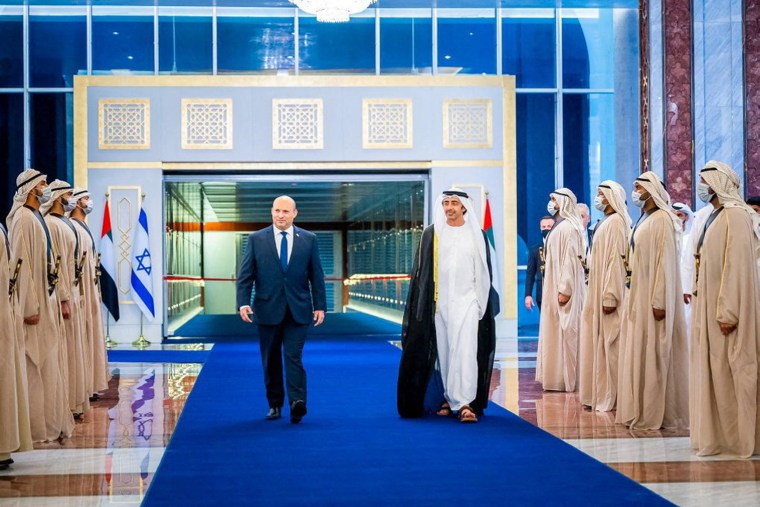TEL AVIV — The leaders of Israel and the United Arab Emirates held their first official meeting on Monday in the most public symbol yet of Israel’s new diplomatic relations with former Arab adversaries amid shared fears about Iran.
Crown Prince Mohammed bin Zayed, the de facto ruler of the UAE, hosted Israel’s prime minister, Naftali Bennett, at his palace in Abu Dhabi. The two men — one in a traditional Arab thobe, the other wearing a Jewish yarmulke — smiled as they shook hands for the cameras.
The landmark meeting came more than a year after the signing of the Abraham Accords, a series of agreements brokered by the Trump administration that helped establish diplomatic relations between Israel and the Gulf Arab states of the UAE and Bahrain.
An honor guard and the UAE’s foreign minister welcomed Bennett, a right-wing politician who ousted Benjamin Netanyahu from the prime minister’s office in June after forming a coalition government with centrist and left-wing parties.
“The partnership and friendship between us is natural,” Bennett said in an interview with the UAE’s state news agency on Monday. “The deepening of relations between the two countries is a great asset to our two countries and our two peoples, and to the whole region.”

Both sides have been eager to talk up trade and economic relations and to look for ways to collaborate on technology. But their new partnership has also been powered by shared worries about their regional neighbor and Israel’s arch enemy: Iran.
Israel and the Gulf Arab states were both dismayed by President Obama’s 2015 nuclear agreement with Iran, which saw the United States lift crippling sanctions in return for an Iranian commitment to curb its nuclear program.
Former President Donald Trump withdrew from the deal in 2018 but Israel and the UAE are now both watching closely as President Joe Biden tries to salvage the agreement. Indirect negotiations between the U.S. and Iran in Vienna appear to have stalled in recent weeks. Secretary of State Anthony Blinken said earlier this month Iran “does not seem to be serious” about the talks.
The UAE has taken tentative steps recently to improve ties with Iran. Last week, the country’s national security advisor travelled to Tehran for talks with Iranian counterparts.
Israel and Iran remain archenemies in the region. Israel has warned repeatedly that it is prepared to use military force to stop Iran from even getting close to a nuclear weapon. Such a strike has the potential to spark a regional conflict, which could drag the UAE and its neighbors into the fighting.
During the meeting, the crown prince expressed his hope “that stability will prevail in the Middle East,” according to a report in WAM, the Emirati state news agency.
The UAE’s decision to make peace with Israel dealt a major blow to Palestinian ambitions to one day end the half-century Israeli occupation of the West Bank and establish an independent Palestinian state.
The UAE and other Arab states had previously offered Israel diplomatic relations only in return for an end to the occupation. But the 2020 peace deal went ahead without concessions to the Palestinians, sparking accusations from Palestinian leaders of a betrayal by the UAE.
The Palestinian Authority did not immediately respond to an NBC News request for comment about Monday’s meeting in Abu Dhabi.
The summit took place in a tightly-controlled media environment. The leaders did not make public statements nor hold a press conference. Bennett travelled to Abu Dhabi without his usual travelling pool of Israeli journalists. Reporters Without Borders ranks the UAE as 131 out of 180 in its global index of press freedom.
The Abraham Accords were a result partly of the close relationship between Trump and then-Israeli prime minister Netanyahu. But ties between the two leaders appear to have soured dramatically since they both lost power.
In an interview with Israeli journalist Barak Ravid for a new book about the peace deal, Trump lashed out at Netanyahu for congratulating President Biden on his 2020 election victory and said he had not spoken to the Israeli leader since then.
“F--- him,” Trump said.
The comments have been widely reported in Israel and are a serious political headache for Netanyahu, who still hopes to one day regain the prime minister’s office for a third time. He has repeatedly presented himself to Israeli voters as uniquely close to the White House but that claim seems undermined by Trump’s anger.
“I highly appreciate President Trump’s big contribution to Israel and its security,” Netanyahu said in a statement. “I also appreciate the importance of the strong alliance between Israel and the U.S. and therefore it was important for me to congratulate the incoming President.”